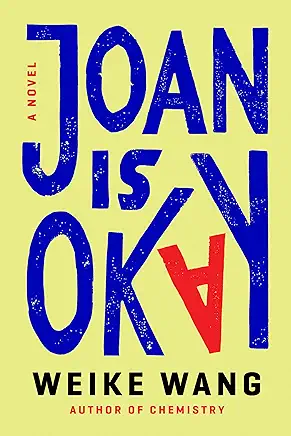
I just loved Joan is Okay and Wang’s writing. I immediately felt protective of Joan, the protagonist, an attending ICU physician in a New York hospital. She finds great comfort in her work, and she is good at it. She chooses to live a private life, sees her apartment as utilitarian, and has no desire to date, marry or have children. It is her career that provides her with the comforts of home. She considers the United States home since she was born American even though her parents had been Chinese immigrants who returned to China after Joan and her brother Fang were adults and self-sufficient.
The people in Joan’s life decide that her personal choices are not okay. The author made me wonder whether it is her Chinese heritage, her being female, or her confidence as an Asian female that led to lifelong encounters with people who find her to be atypical, abnormal, or just not okay in some way. But, of course, life experience tells me all of those conditions lead to unsolicited comments, judgments, and preconceived notions. She has a coworker, Madeline, who thinks she should save eggs for future childbearing. Her neighbor thinks she should read his discarded books, have more furniture and socialize more. Her brother insists she should leave NYC and work at a hospital in Greenwich, Connecticut. She also has a mother, sister-in-law, and hospital director who all weigh in on Joan’s best interests. It doesn’t seem to matter what pleases Joan.
Without being didactic, Wang has a poignant way of describing Asian Americans and the alienation they have experienced in our country, both historically and during the current pandemic. She does it through relatable dialog between Joan and the people in her life: her mother, brother, neighbor, colleagues, etc. In addition, the characters’ words and actions convey harrowing feelings as they disregard Joan’s feelings and wishes.
Additionally, themes allow us to consider what the American dream means, especially to immigrants. The lifestyle of Joan’s brother Fang and his wife Tami provides fodder for analyzing materialism and American wealth. Events in the story give pause to philosophical and familial differences between Easterners and Westerners. Finally, the flashbacks to school guidance counselors determined to find a pathological label for Joan’s introverted and studious behaviors would be funny if they didn’t reflect reality so well.
After reading and enjoying Yu’s Interior Chinatown and Salesses’s Disappear Doppelgänger Disappear, I appreciated Joan is Okay for portraying similar themes using everyday relatable characters. I thank NetGalley for providing a copy of this thought-provoking novel.


